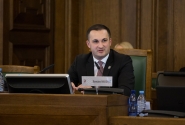
SMEs form the backbone of our economies; therefore, digital economy is vital to small- and medium-sized businesses in particular. It is also important to consumers using digital solutions and driving the demand for them. This was the key message from Romāns Naudiņš, Chairman of the Economic, Agricultural, Environmental and Regional Policy Committee of the Saeima, to colleagues representing parliaments of all the European Union member states who gathered at the Saeima on Monday, 20 April.
“SMEs work much closer with their consumers and create digital products that drive our economies, boosting employment, as well. We, parliamentarians, have to recognise the future advantages of the single digital market and encourage our businesses and people to move towards such a market”, Naudiņš underlined.While addressing his colleagues, the Chairman of the Economic Committee of the Saeima urged EU parliamentarians to agree on the structure of the digital single market, and invited his counterparts to share their national experiences.
“Before we set up the digital single market, we must boost confidence in the digital space, put data protection in place, remove cross-border trade barriers, create digital infrastructure, make sure the public sector acts as a catalyst to innovation in digital services, make investments in innovation and R&D, as well as e-skills”, Chairman Naudiņš stressed after pointing out that the EU should start working on the legal framework right away to speed up growth in various sectors of the digital economy.
“We must come to a consensus on those sections of international treaties that deal with elements of the digital economy. We must also support development of common technical standards, enabling Europe-based companies to access benefits of the EU’s single market. If we do our bit, together with businesses we will be able to unlock the growth potential projected by the Juncker investment plan and generate up to EUR 350 billion more in terms of GDP, create thousands of new jobs and sustainable societies”, Naudiņš told his colleagues from other parliaments.
Talking about the topics discussed during the meeting, the Chairman of the Committee underlined that big data is a new phenomenon that has emerged from the digital economy, and innovative use of such data sets may boost productivity of EU’s economy, whereas cloud computing is essential in capitalising on the promise of big data and is set to allow even small companies to offer their products and services on the global market.
As regards the other key topic of the conference – cyber security and privacy, Naudiņš said that privacy arrangements should be EU’s competitive advantage on the global digital market. As for the labour market, there is quite a strange inconsistency: on the one hand unemployment is relatively high, especially among youth, on the other hand, there is huge demand for skilled IT specialists.
During the meeting the EU parliamentarians held a moment of silence to honour the victims of the tragedy in the Mediterranean.
Today members of the EU member state parliaments gathered at the Saeima to discuss the state of the digital economy. The agenda of the conference focuses on big data, cloud computing, cyber security and privacy, education and jobs in the digital economy. The meeting of the Chairpersons of the Committees on the Economic and Digital Affairs is the fifth event hosted by the Saeima within the framework of the Latvian Presidency of the Council of the EU.
Live stream of the meeting is available on the website of the Parliamentary Dimension of the Latvian Presidency at http://parleu2015.lv/en. For the programme of the meeting, please visit http://parleu2015.lv/files/digitala-konference/programme_digital_eng_15-04-2015.pdf.
Saeima Press Service







